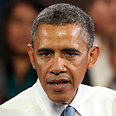
Despite Obama call, senators promote Iran sanctions
While disregarding US President request to not breach interim nuclear deal with Iran, Democratic, Republican senators endorse new sanctions on Islamic Republic
The drafted proposal is signed by Republican Senator Mark Kirk and Democratic Senators Chuck Schumer and Chairman of the Senate Foreign Relations Committee Robert Menendez. It is no surprise that Kirk is promoting steps opposing White House stances; however, Schumer and Menendez's move bear greater significance.
Related stories:
- US hits firms over Iran; sanctions debate goes on
- Kerry raises doubts if Iran ready for final deal
- Op-ed: Untrustworthy American president
President Obama recently hosted senators in the White House in an effort to influence them that the new legislation on sanctions could risk not only the negotiations with Iran, but may also have other countries lifting sanctions on Tehran, claiming that thr US is not operating in good faith in the nuclear talks. His deputy Joe Biden and Secretary of State John Kerry were sent on persuasion missions and met with senators in Congress behind closed doors.
France doubtful of final deal
Meanwhile, French Foreign Minister Laurent Fabius voiced hesitation in regards to the world powers' ability to achieve a final and comprehensive agreement with Iran on the nuclear matter. Fabius, a hardliner in the Geneva talks, raised doubts whether Tehran is indeed willing to forgo its abilities to produce nuclear weapons.
In an interview with the Wall Street Journal, the French foreign minister said: "We have to implement honestly the first phase, and then my main concern is the second phase. It is unclear if the Iranians will accept to definitively abandon any capacity of getting a weapon or only agree to interrupt the nuclear program."
Fabius further told the Wall Street Journal that Western powers need to focus their efforts on how to deprive Iran of "breakout capacity," the ability to restart a bomb-making program from dormant nuclear sites and make a quick dash to a weapon before world powers can react.
The US House of Representatives passed a resolution in July to impose sanctions on exporting crude oil from Iran. Today, oil exports from Iran stand at one million barrels a day, compared to 2.5 million barrels prior to the sanctions. The senators are now faced with a similar resolution. The legislation must pass the two legislative houses in order to become a law that would be submitted to President Barack Obama for singing off.
A sense of unease roams within the Senate from the first phase of the Western deal with Tehran, and contrary to the administration's request, the senators decided to present a new sanctions bill on January 6, upon returning from Christmas and New Years vacation, in order for the government to immediately act on it if Iran violated its commitment in the Geneva deal, or in case the talks fail.
The senators allow the president the option to sign a freeze of the new bill every 30 days in which Iran acts according to the deal and in which it is not funding or executing terrorist activities against US targets.
- Receive Ynetnews updates directly to your desktop










